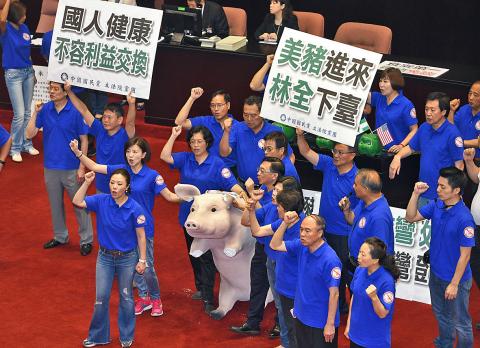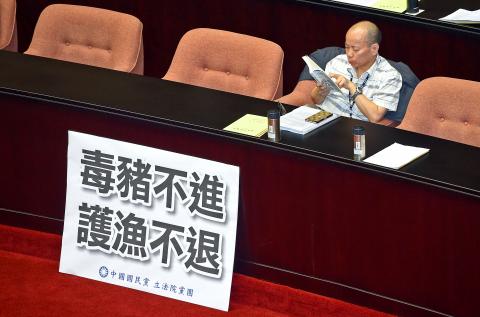The Chinese Nationalist Party (KMT) caucus yesterday morning disrupted a presentation Premier Lin Chuan (林全) was giving to the legislature, while outside the Legislative Yuan, a rally supposedly led by pig farmers, fishermen and KMT supporters protested against US pork imports containing ractopamine and “the neglect” of fishermen’s rights.
KMT lawmakers chanting slogans and holding up placards reading: “[If] US pork is imported, [then] Lin Chuan steps down,” “US pork is laced with drugs, Taiwan does not want it” and “Green U-turns have fooled the whole of Taiwan,” put three models of green pigs on the front lectern — a mocking allusion to President Tsai Ing-wen’s (蔡英文) “three little pigs” fundraising effort during her election campaign.
The chaos prompted Legislative Speaker Su Jia-chyuan (蘇嘉全) to call a break after a few minutes, with the premier also leaving the main chamber and going to a back room, which moved KMT lawmakers to shout: “Runaway premier.”

Photo: Lo Pei-der, Taipei Times
The lawmakers held up enlarged copies of a “pledge letter,” which they called on the premier to sign to promise not to allow the import of US pork or the import of products from the five Japanese prefectures that were affected by radioactive fallout from the Fukushima Dai-ichi nuclear power plant disaster in March 2011. They also called on Lin to ensure Taiwanese fishermen’s rights are protected in disputed waters near the Okinotori atoll in the Pacific Ocean.
While the crowd outside the Legislative Yuan dispersed at about noon, KMT lawmakers gathered in the front of the main chamber to again call out slogans before the legislative speaker reappeared and announced a formal break, saying that the floor meeting would resume at 2:30pm.
Following the recess announcement, Democratic Progressive Party (DPP) caucus whip Ker Chien-ming (柯建銘) said that the DPP had never asked KMT premiers to sign “pledge letters” even during its fiercest protests.

Photo: Lo Pei-der, Taipei Times
He told reporters that during negotiations, the KMT caucus asked for protesters from outside the Legislative Yuan to be allowed to stage a sit-in inside the legislative compound, which Ker said “was impossible.”
The meeting resumed at 2:30pm, but KMT lawmakers’ obstructed the proceedings again, as they continued to occupy podiums and chant slogans, asking the premier to “promise before stepping onto the podium.”
The legislative speaker therefore again called for a break for lawmakers to “calm down.”
Lin also left the floor chamber after the announcement was made.
When fielding questions from reporters before entering the chamber in the afternoon, Lin said that the Executive Yuan would communicate with the legislature to make sure that the public feels “secure” about the government’s policies.
The DPP caucus said at an afternoon news conference in the afternoon that the KMT was occupying podiums over a “pseudo issue,” because there was no negotiation ongoing between the government and the US about the import of US pork.
The government has been in power for a little more than 10 days and the KMT has already started to obstruct it, DPP Legislator Hsu Kuo-yung (徐國勇) said, adding that the KMT did not even know how to be “a loyal opposition party.”
The KMT caucus said that their issues were “real” as they concerned the public’s rights and health and therefore required the premier’s open promise.
Su and Lin returned to the legislative floor at 5:45pm, with the KMT lawmakers still boycotting, and processed — amid the KMT lawmakers’ chanting of slogans — a motion proposed by the New Power Party caucus to prolong the meeting to midnight, which was voted down by DPP legislators. Su announced the adjournment of the floor meeting at about 6pm, which ended the KMT caucus’ day-long demonstration.

The CIA has a message for Chinese government officials worried about their place in Chinese President Xi Jinping’s (習近平) government: Come work with us. The agency released two Mandarin-language videos on social media on Thursday inviting disgruntled officials to contact the CIA. The recruitment videos posted on YouTube and X racked up more than 5 million views combined in their first day. The outreach comes as CIA Director John Ratcliffe has vowed to boost the agency’s use of intelligence from human sources and its focus on China, which has recently targeted US officials with its own espionage operations. The videos are “aimed at

STEADFAST FRIEND: The bills encourage increased Taiwan-US engagement and address China’s distortion of UN Resolution 2758 to isolate Taiwan internationally The Presidential Office yesterday thanked the US House of Representatives for unanimously passing two Taiwan-related bills highlighting its solid support for Taiwan’s democracy and global participation, and for deepening bilateral relations. One of the bills, the Taiwan Assurance Implementation Act, requires the US Department of State to periodically review its guidelines for engagement with Taiwan, and report to the US Congress on the guidelines and plans to lift self-imposed limitations on US-Taiwan engagement. The other bill is the Taiwan International Solidarity Act, which clarifies that UN Resolution 2758 does not address the issue of the representation of Taiwan or its people in

US Indo-Pacific Commander Admiral Samuel Paparo on Friday expressed concern over the rate at which China is diversifying its military exercises, the Financial Times (FT) reported on Saturday. “The rates of change on the depth and breadth of their exercises is the one non-linear effect that I’ve seen in the last year that wakes me up at night or keeps me up at night,” Paparo was quoted by FT as saying while attending the annual Sedona Forum at the McCain Institute in Arizona. Paparo also expressed concern over the speed with which China was expanding its military. While the US

SHIFT: Taiwan’s better-than-expected first-quarter GDP and signs of weakness in the US have driven global capital back to emerging markets, the central bank head said The central bank yesterday blamed market speculation for the steep rise in the local currency, and urged exporters and financial institutions to stay calm and stop panic sell-offs to avoid hurting their own profitability. The nation’s top monetary policymaker said that it would step in, if necessary, to maintain order and stability in the foreign exchange market. The remarks came as the NT dollar yesterday closed up NT$0.919 to NT$30.145 against the US dollar in Taipei trading, after rising as high as NT$29.59 in intraday trading. The local currency has surged 5.85 percent against the greenback over the past two sessions, central